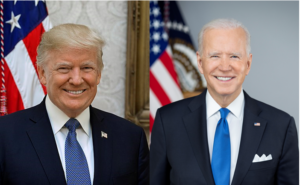 The general election has begun. Well, not really, but you know what I mean.
The general election has begun. Well, not really, but you know what I mean.
As we survey last night’s Super Tuesday results, President Joe Biden and former President Donald Trump are now on the respective cusp of winning the Democratic and Republican 2024 Presidential nominations.
In the Democratic primary, Biden won all 15 state contests last night, giving him 1,517 delegates and counting as he approaches the 1,968 delegates he needs to secure the nomination.
Meanwhile, in the Republican primary, Trump won 13 of last night’s 14 statewide contests. As of this writing, Trump’s accumulated 985 delegates and counting as he nears the 1,215 threshold to win the nomination.
Sure, Nikki Haley won her first state last night by carrying Vermont, and James Palmer shocked everyone by grabbing the poorly attended American Samoa Caucus. Nevertheless, Haley’s received just 82 delegates so far (and counting) while any Democratic challenger will struggle to break single digits.
Are voters paying attention? Well, historically, quite a few viewers tune in for Super Tuesday election coverage. I went digging into online archives and found some numbers to illustrate this.
2004: 2.31 million viewers (for CNN and Fox News)
2008: 24.316 million viewers (8.716 million for cable and 15.6 million for ABC, CBS and NBC)
2012: 8.106 million viewers (5.545 million for cable and 2.561 million for NBC)
2016: 23.561 million viewers (10.441 million for cable and 13.12 million for ABC, CBS and NBC)
2020: 19.086 million viewers (10.785 for cable and 8.301 for ABC, CBS and NBC)
Regardless, with the State of the Union coming on Thursday, Joe Biden will be fully shifting into general election mode. I’ll have more on the Presidential race stands next week, but for now, let’s finish with a look at some of the more notable Congressional, Gubernatorial and Senate primaries.
First off, all eyes were on the Golden State and their top-two blanket Senate primary. As I noted last month, Democratic Rep. Adam Schiff employed a clever scheme to avoid a Dem-vs-Dem match-up in deep blue California, by using his TV ads to elevate ex-L.A. Dodger and Republican candidate Steve Garvey.
This strategy worked out especially well as Schiff and Garvey both secured the top two spots over Democratic Congresswomen Katie Porter and Barbara Lee.
With about half of the vote in, Rep. Schiff sits atop the field with 1,139,904 votes (36.1%), followed by Garvey’s 934,159 votes (29.6%). Porter is far behind in third with 459,114 votes (14.5%) while Lee has just 229,875 votes (7.3%).
Down south in Texas, Colin Allred avoided a run-off for the Democratic Senate nomination by collecting 58% of the vote (with about 75% of precincts in). He’ll go on to face incumbent Republican Senator Ted Cruz in November.
Over in North Carolina, voters chose the Democratic and Republican nominations in the open Gubernatorial race. Lt. Governor Mark Robinson won the GOP primary with 658,494 votes (64.8%), whereas Attorney General Josh Stein led the Democratic contest with 474,992 votes (69.7%).
Finally, we got our first ousted incumbent of the 2024 cycle down in Alabama. In the new 1st Congressional District, two sitting Congressmen – Jerry Carl and Barry Moore – each fought to out-flank the other on the right for this ruby red seat. Rep. Carl had the geographical advantage, 59% of the new district overlapped with his old district, as well as the fundraising edge, but it wasn’t enough to make him the victor.
Instead Congressman Moore prevailed in this closely-contested primary. With nearly all of the precincts in, Moore received 53,805 votes (51.8%) against Carl’s 50,156 votes (48.2%).
Feel free to dig into all the Super Tuesday results here at Decision Desk HQ, and come back on March 12th for coverage of the Georgia, Mississippi and Washington primaries. And as always, keep an eye out for my day-after recap!